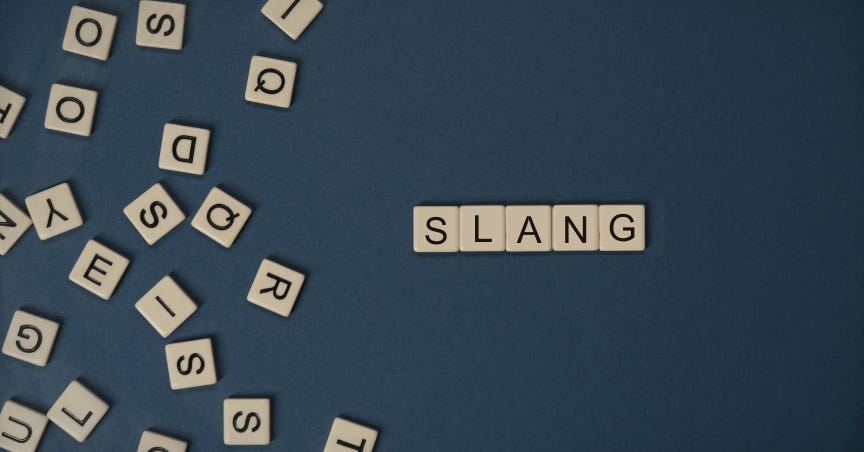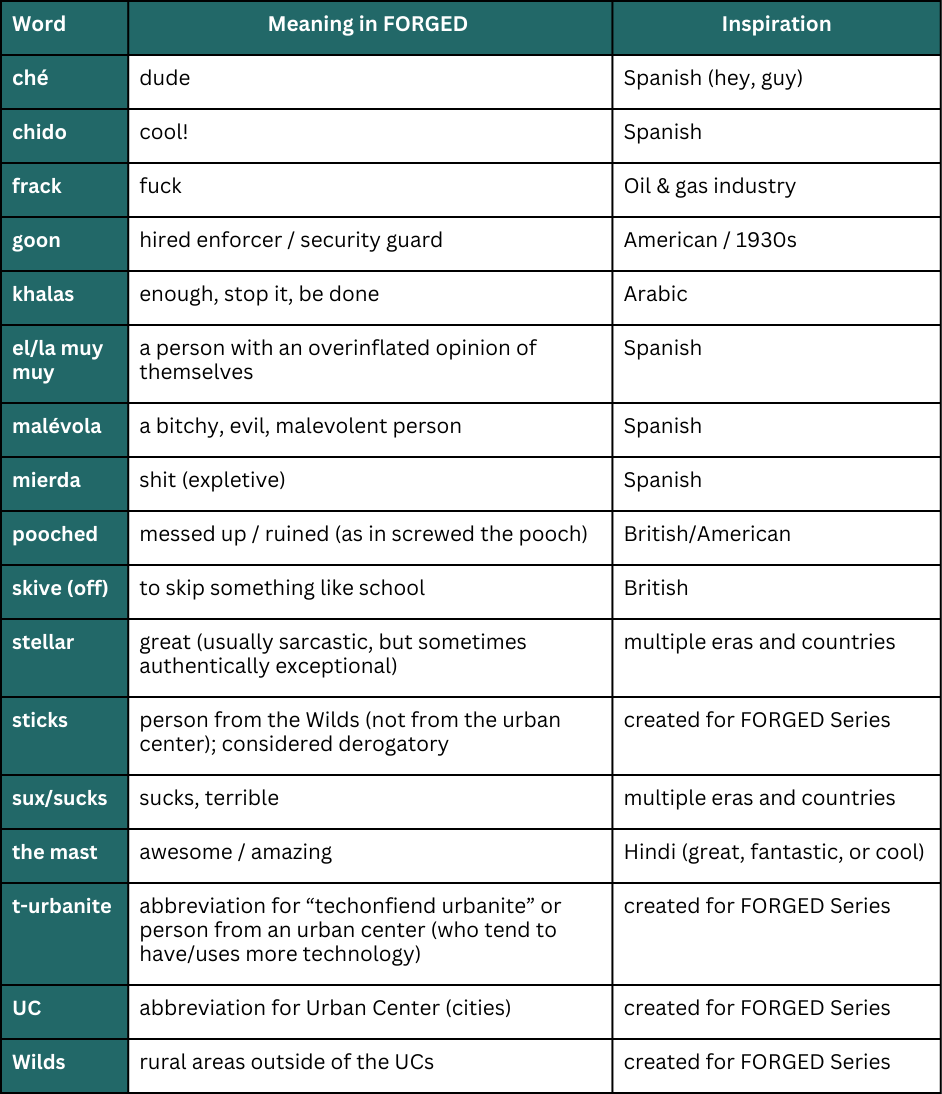How to pick compelling character names and stellar slang
Forged Series: my writing process unmasked
To learn more about the FORGED series, visit the Table of Contents.
We all need inspiration from somewhere…
A couple of years out of college, my job at a global athletic products company included the task of naming new products. You can’t just call something Sports Warm-up. You had to NAME it. It had to be something like Wildwood Running Shorts or Balance Jacket. Four to five times each year, hundreds of products were launched, and each had to be named. It was exhausting.
My go-to source of inspiration was the atlas. (Globes were no longer a thing, and Google Maps was not commonplace yet.) I’d open a world or road atlas to a random page, close my eyes, and point. Ta-da! Cypress. Bandon. Ozark. Product names!1
The above video is a silly example of an author's process to select a name (or make up a name). Choosing a name is not easy. You don’t want to pick a name of a person from your social circle because they might not appreciate it.2 So, how did I go about selecting names?
I relied heavily on maps and baby name sites to find meaningful names.
I talked about choosing the names of two of the main characters of the FORGED Series here and here.
FORGED Series Characters, the meaning of their name, and why the name was selected.
Clarissa - (Greek, Latin) smart, clear-minded [for her teacher persona]
Contessa - (Italian) Countess, royalty, pretty [main character who is of course pretty and could be considered “royalty-like” by the end of the series]
Declan - (Irish) full of goodness, strong [he is a towering powerhouse physically but with a gentle and kind demeanor]
Elsa - (Scandinavian) patient [for her patient personality]
Finn - (Irish) fair [for his pale complexion]
Jenna - (English) fair phantom, sweet [for her almost translucent hair and skin and her sweet, bubbly personality]
Milo - (German) soldier [General of the UPT security forces]
Ruth - (Hebrew) friendship, compassionate, loyal [as one of Tessa’s mentors, she shows deep compassion and creates a strong connection with Tessa]
Shay - (Irish) hawk [for her hawk-like ability to read situations and help her clients]
World Specific Language
I chose to set the FORGED Series 110 years in the future, so part of the writing process included determining how language would remain the same or evolve over time. Because modern vocabulary is a melting pot of cultures and languages, I dropped down deep rabbit holes to find the right mix of words for the story.
I researched common slang from different eras (1920s, 1930s, 2020s), regions (American, British, Greek, Mexican Spanish), and industries (gaming, tech/coding, military), to name a few. Just like fashion trends, which tend to cycle back around, I recycled some words directly. I also allowed for linguistic drift.3 Finally, I added some newly created words.
Because my world-building assumed that Spanish was more prevalently incorporated into the new world’s lexicon, several direct-from-Spanish words are mixed into the dialog. For example, the Spanish word for “hey” or “guy” or “fellow” is used by the teens in the FORGED series. They say “ché” in the way current US teens (at least when I was a teen) would say “dude.” Likewise, “chica” is used in place of “girl” or “girlfriend.”
Below are some other slang words and world-specific terms sprinkled throughout the series:
Forward progress
Finally, I made some distinct and purposeful decisions. I had decided that the toilets would be non-gender specific. Sports would not be separated by gender. And instead of Mr. and Mrs. before a teacher’s or adult’s name, I went with Mx. as the honorific.
“What’s your first class?” Isaiah followed me through the front door and asked.
I double-tapped the screen of my Omniband to wake it up and read aloud, “Level Two Calculus with Mx. Fenton.” I glanced sideways at him when he chuckled. “What? Did I say his name wrong?”
Isaiah wrinkled his nose and sucked a breath through his teeth. “No, not exactly.” His voice softened, “But you said ‘mix’ Fenton. We use more of a ‘uh’ sound. Or say it like you’re swallowing the vowel sound. Smoosh the ‘m’ and ‘x’ together, and your Wild accent won’t be as noticeable.”
Excerpt from Shattered, book one of the FORGED Series, coming in early 2025 from Provender Press
I have to hope that in 110 years, non-binary changes such as these examples will be integrated into our society. Maybe I’m making a statement, but also, the statement needs to be made. If not the FORGED Series, then some other work of fiction needs to be the catalyst for the acceptance of new vocabulary.4
I talk more about selecting names and creating slang (plus an embarrassing store) here⤵️
What I’m reading (or on my TBR list)
Here are some other dystopian and SciFi fiction pieces available on Substack or as published books that you might enjoy. Plus, a thought-provoking non-fiction piece.
Initiation: Mindbinding - delivers a thought-provoking future with words that create a visceral experience. Find episode one here.
Anderson Station - Hop into chapter one from
and you will not be disappointed!My Favorite Suspects -
just released an expanded novel of his serial fiction posted earlier this year on Substack. Available on Amazon here. I’m excited to see how the story has evolved and been enriched!Breaking Sky - Though I haven’t found author Cory McCarthy on Substack, this novel is a fun read, and I want you to know about it! Available on Amazon here.
Plethora - You can always count on
to give something to think about. And his recent post about “plethora” had no shortage of thoughts!
Before you go
Did you enjoy this post? Click subscribe so you don’t miss future posts. Tap the heart to let me know. Restack your favorite quote. Share with your community. Recommend me to your followers. Leave a comment.
This process worked well until I selected the name “Thurston” for a warm-up suit in May 1998. Thankfully, I was able to change the name before the catalog came out.
After completing my series, I started a new “real” job and realized that my main character is the SAME name as a new co-worker. Plus, the #1 crush is the same name as another co-worker’s son. Oh, and one of my villains has the same name as a good friend’s new girlfriend. *sigh* I tried not to name anyone in my book with the same name as someone from my real life.
Words that are in our modern vocabulary thanks to fiction writers (book title/author/year it was first published): Cyberspace (Neuromancer/Gibson/1984), Robot (Rossum’s Universal Robots/Capek/1920), Smog (The Jungle/Sinclair/1906), and Dystopia (1984/Orwell/1949).








Thanks for the mention, CB!
Interesting! The far future of my dystopian novel is so far in the future (c. 1000 years) that language would be entirely different. So I just had them speak everyday English with a few jargon terms that fit their hunter-gatherer society.
Are you familiar with The Expanse? The authors did a similar thing with Belter Cant, which is a mashup of a bunch of different languages.